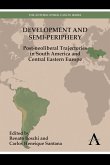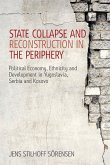Development and Semi-periphery
Post-neoliberal Trajectories in South America and Central Eastern Europe
Herausgeber: Boschi, Renato; Santana, Carlos Henrique
Development and Semi-periphery
Post-neoliberal Trajectories in South America and Central Eastern Europe
Herausgeber: Boschi, Renato; Santana, Carlos Henrique
- Gebundenes Buch
- Merkliste
- Auf die Merkliste
- Bewerten Bewerten
- Teilen
- Produkt teilen
- Produkterinnerung
- Produkterinnerung
This book is a collection of articles focusing on comparative analysis of the development trajectories in the semi-periphery countries of South America and Central and Eastern Europe.
Andere Kunden interessierten sich auch für
![Development and Semi-periphery Development and Semi-periphery]() Development and Semi-periphery51,99 €
Development and Semi-periphery51,99 €![Agricultural Sector Issues in the European Periphery Agricultural Sector Issues in the European Periphery]() Agricultural Sector Issues in the European Periphery44,99 €
Agricultural Sector Issues in the European Periphery44,99 €![State Collapse and Reconstruction in the Periphery State Collapse and Reconstruction in the Periphery]() Jens Stilhoff SörensenState Collapse and Reconstruction in the Periphery40,99 €
Jens Stilhoff SörensenState Collapse and Reconstruction in the Periphery40,99 €![Exchange-Rate Devaluation in a Semi-Indusrialized Country Exchange-Rate Devaluation in a Semi-Indusrialized Country]() Carlos F. Diaz AlejandroExchange-Rate Devaluation in a Semi-Indusrialized Country29,99 €
Carlos F. Diaz AlejandroExchange-Rate Devaluation in a Semi-Indusrialized Country29,99 €![Camac and PV of Urban and Semi Urban School Boys Camac and PV of Urban and Semi Urban School Boys]() Ramesh Babu JampanaCamac and PV of Urban and Semi Urban School Boys49,99 €
Ramesh Babu JampanaCamac and PV of Urban and Semi Urban School Boys49,99 €![Unsettled Issues Concerning Semi-Automated Vehicles Unsettled Issues Concerning Semi-Automated Vehicles]() Francesca FavaroUnsettled Issues Concerning Semi-Automated Vehicles132,99 €
Francesca FavaroUnsettled Issues Concerning Semi-Automated Vehicles132,99 €![Agricultural Sector Issues in the European Periphery Agricultural Sector Issues in the European Periphery]() Agricultural Sector Issues in the European Periphery54,99 €
Agricultural Sector Issues in the European Periphery54,99 €-
-
This book is a collection of articles focusing on comparative analysis of the development trajectories in the semi-periphery countries of South America and Central and Eastern Europe.
Hinweis: Dieser Artikel kann nur an eine deutsche Lieferadresse ausgeliefert werden.
Hinweis: Dieser Artikel kann nur an eine deutsche Lieferadresse ausgeliefert werden.
Produktdetails
- Produktdetails
- Verlag: Anthem Press
- Seitenzahl: 338
- Erscheinungstermin: 15. März 2012
- Englisch
- Abmessung: 235mm x 157mm x 24mm
- Gewicht: 700g
- ISBN-13: 9780857284402
- ISBN-10: 0857284401
- Artikelnr.: 34445482
- Herstellerkennzeichnung
- Libri GmbH
- Europaallee 1
- 36244 Bad Hersfeld
- gpsr@libri.de
- Verlag: Anthem Press
- Seitenzahl: 338
- Erscheinungstermin: 15. März 2012
- Englisch
- Abmessung: 235mm x 157mm x 24mm
- Gewicht: 700g
- ISBN-13: 9780857284402
- ISBN-10: 0857284401
- Artikelnr.: 34445482
- Herstellerkennzeichnung
- Libri GmbH
- Europaallee 1
- 36244 Bad Hersfeld
- gpsr@libri.de
Renato Boschi holds a PhD in political science from the University of Michigan, and is currently Full Professor in Political Science at the Institute of Social and Political Studies, IESP-UERJ. Carlos Henrique Santana holds a PhD in political science from the Institute of Social and Political Studies, IESP-UERJ, was formerly Assistant Professor in Political Science at the Federal University of Rio de Janeiro (UFRJ), and is currently a researcher at the International Celso Furtado Center for Development Policies and at the NEIC-IESP.
List of Tables and Figures; Introduction – Renato Boschi and Carlos
Henrique Santana; PART I DEVELOPMENT, MACROECONOMIC POLICIES AND VARIETIES
OF CAPITALISM; Chapter 1. Postsocialist States in the System of Global
Capitalism: A Comparative Perspective – David Lane; Chapter 2. Politics and
Development: Lessons from Latin America – Renato Boschi and Flavio Gaitán;
Chapter 3. Managing the Faustian Bargain: Monetary Autonomy in the Pursuit
of Development in Eastern Europe and Latin America – Joseph Nathan Cohen;
Chapter 4. Development and Dependency, Developmentalism and Alternatives –
José Maurício Domingues; PART II POLITICAL CULTURE, IDENTITY POLITICS AND
POLITICAL CONTENTION; Chapter 5. Indigenous Movements in Bolivia, Ecuador
and Peru – Xavier Albó; Chapter 6. Path Dependence versus Adaptation in
Estonian Ethnopolitics – Raivo Vetik; Chapter 7. Integration Parliaments in
Europe and Latin America: Explaining Variations – Juliana Erthal; PART III
IDEAS AND THE ROLE OF ELITES AND ADVOCACY NETWORKS: TRANSLATING AND
LEGITIMATING THE FRONTIERS OF INSTITUTIONAL REFORMS; Chapter 8. Marketing
Professional Expertise by (Re)Inventing States: Professional Rivalries
between Lawyers and Economists as Hegemonic Strategies in the International
Market for the Reproduction of National State Elites – Yves Dezalay and
Bryant Garth; Chapter 9. Identity, Policy Preferences and the Perception of
the European Integration Process among the Hungarian Elites – György
Lengyel and Borbála Göncz; Chapter 10. Critical Junctures, Institutional
Legacies and Epistemic Communities: A Development Agenda in Brazil – Carlos
Henrique Santana; PART IV ECONOMIC REFORMS, PUBLIC POLICIES AND
DEVELOPMENT; Chapter 11. Development and Citizenship in the Semi-periphery:
Reflecting on the Brazilian Experience – Krista Lillemets; Chapter 12. The
Periphery Paradox in Innovation Policy: Latin America and Eastern Europe
Compared – Rainer Kattel and Annalisa Primi; Chapter 13. The Lula
Government and the Social Democratic Experience in Brazil – Fabiano Santos
Henrique Santana; PART I DEVELOPMENT, MACROECONOMIC POLICIES AND VARIETIES
OF CAPITALISM; Chapter 1. Postsocialist States in the System of Global
Capitalism: A Comparative Perspective – David Lane; Chapter 2. Politics and
Development: Lessons from Latin America – Renato Boschi and Flavio Gaitán;
Chapter 3. Managing the Faustian Bargain: Monetary Autonomy in the Pursuit
of Development in Eastern Europe and Latin America – Joseph Nathan Cohen;
Chapter 4. Development and Dependency, Developmentalism and Alternatives –
José Maurício Domingues; PART II POLITICAL CULTURE, IDENTITY POLITICS AND
POLITICAL CONTENTION; Chapter 5. Indigenous Movements in Bolivia, Ecuador
and Peru – Xavier Albó; Chapter 6. Path Dependence versus Adaptation in
Estonian Ethnopolitics – Raivo Vetik; Chapter 7. Integration Parliaments in
Europe and Latin America: Explaining Variations – Juliana Erthal; PART III
IDEAS AND THE ROLE OF ELITES AND ADVOCACY NETWORKS: TRANSLATING AND
LEGITIMATING THE FRONTIERS OF INSTITUTIONAL REFORMS; Chapter 8. Marketing
Professional Expertise by (Re)Inventing States: Professional Rivalries
between Lawyers and Economists as Hegemonic Strategies in the International
Market for the Reproduction of National State Elites – Yves Dezalay and
Bryant Garth; Chapter 9. Identity, Policy Preferences and the Perception of
the European Integration Process among the Hungarian Elites – György
Lengyel and Borbála Göncz; Chapter 10. Critical Junctures, Institutional
Legacies and Epistemic Communities: A Development Agenda in Brazil – Carlos
Henrique Santana; PART IV ECONOMIC REFORMS, PUBLIC POLICIES AND
DEVELOPMENT; Chapter 11. Development and Citizenship in the Semi-periphery:
Reflecting on the Brazilian Experience – Krista Lillemets; Chapter 12. The
Periphery Paradox in Innovation Policy: Latin America and Eastern Europe
Compared – Rainer Kattel and Annalisa Primi; Chapter 13. The Lula
Government and the Social Democratic Experience in Brazil – Fabiano Santos
List of Tables and Figures; Introduction – Renato Boschi and Carlos
Henrique Santana; PART I DEVELOPMENT, MACROECONOMIC POLICIES AND VARIETIES
OF CAPITALISM; Chapter 1. Postsocialist States in the System of Global
Capitalism: A Comparative Perspective – David Lane; Chapter 2. Politics and
Development: Lessons from Latin America – Renato Boschi and Flavio Gaitán;
Chapter 3. Managing the Faustian Bargain: Monetary Autonomy in the Pursuit
of Development in Eastern Europe and Latin America – Joseph Nathan Cohen;
Chapter 4. Development and Dependency, Developmentalism and Alternatives –
José Maurício Domingues; PART II POLITICAL CULTURE, IDENTITY POLITICS AND
POLITICAL CONTENTION; Chapter 5. Indigenous Movements in Bolivia, Ecuador
and Peru – Xavier Albó; Chapter 6. Path Dependence versus Adaptation in
Estonian Ethnopolitics – Raivo Vetik; Chapter 7. Integration Parliaments in
Europe and Latin America: Explaining Variations – Juliana Erthal; PART III
IDEAS AND THE ROLE OF ELITES AND ADVOCACY NETWORKS: TRANSLATING AND
LEGITIMATING THE FRONTIERS OF INSTITUTIONAL REFORMS; Chapter 8. Marketing
Professional Expertise by (Re)Inventing States: Professional Rivalries
between Lawyers and Economists as Hegemonic Strategies in the International
Market for the Reproduction of National State Elites – Yves Dezalay and
Bryant Garth; Chapter 9. Identity, Policy Preferences and the Perception of
the European Integration Process among the Hungarian Elites – György
Lengyel and Borbála Göncz; Chapter 10. Critical Junctures, Institutional
Legacies and Epistemic Communities: A Development Agenda in Brazil – Carlos
Henrique Santana; PART IV ECONOMIC REFORMS, PUBLIC POLICIES AND
DEVELOPMENT; Chapter 11. Development and Citizenship in the Semi-periphery:
Reflecting on the Brazilian Experience – Krista Lillemets; Chapter 12. The
Periphery Paradox in Innovation Policy: Latin America and Eastern Europe
Compared – Rainer Kattel and Annalisa Primi; Chapter 13. The Lula
Government and the Social Democratic Experience in Brazil – Fabiano Santos
Henrique Santana; PART I DEVELOPMENT, MACROECONOMIC POLICIES AND VARIETIES
OF CAPITALISM; Chapter 1. Postsocialist States in the System of Global
Capitalism: A Comparative Perspective – David Lane; Chapter 2. Politics and
Development: Lessons from Latin America – Renato Boschi and Flavio Gaitán;
Chapter 3. Managing the Faustian Bargain: Monetary Autonomy in the Pursuit
of Development in Eastern Europe and Latin America – Joseph Nathan Cohen;
Chapter 4. Development and Dependency, Developmentalism and Alternatives –
José Maurício Domingues; PART II POLITICAL CULTURE, IDENTITY POLITICS AND
POLITICAL CONTENTION; Chapter 5. Indigenous Movements in Bolivia, Ecuador
and Peru – Xavier Albó; Chapter 6. Path Dependence versus Adaptation in
Estonian Ethnopolitics – Raivo Vetik; Chapter 7. Integration Parliaments in
Europe and Latin America: Explaining Variations – Juliana Erthal; PART III
IDEAS AND THE ROLE OF ELITES AND ADVOCACY NETWORKS: TRANSLATING AND
LEGITIMATING THE FRONTIERS OF INSTITUTIONAL REFORMS; Chapter 8. Marketing
Professional Expertise by (Re)Inventing States: Professional Rivalries
between Lawyers and Economists as Hegemonic Strategies in the International
Market for the Reproduction of National State Elites – Yves Dezalay and
Bryant Garth; Chapter 9. Identity, Policy Preferences and the Perception of
the European Integration Process among the Hungarian Elites – György
Lengyel and Borbála Göncz; Chapter 10. Critical Junctures, Institutional
Legacies and Epistemic Communities: A Development Agenda in Brazil – Carlos
Henrique Santana; PART IV ECONOMIC REFORMS, PUBLIC POLICIES AND
DEVELOPMENT; Chapter 11. Development and Citizenship in the Semi-periphery:
Reflecting on the Brazilian Experience – Krista Lillemets; Chapter 12. The
Periphery Paradox in Innovation Policy: Latin America and Eastern Europe
Compared – Rainer Kattel and Annalisa Primi; Chapter 13. The Lula
Government and the Social Democratic Experience in Brazil – Fabiano Santos








